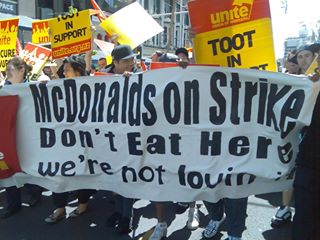
The federal minimum wage has been stuck at $7.25/hour for years. In the last week, fast-food workers in 7 cities went on strike over low wages, but neither the restaurant industry nor Congress seems willing to raise the rate. On my America Weekend show, Slate’s Jeremy Stahl helped me debunk some of the arguments against increasing the minimum wage, such as:
- If we pay workers more, we won’t be able to employ as many people. That’s not how business works. You hire exactly the amount of employees you need to get the job done — you don’t have extra people sitting around doing nothing; you have the staff you need to take the orders, cook the burgers and fries, and clean up afterwards. As long as customers keep coming in, you’re not going to fire anyone. Moreover, in cities that have increased the minimum above the federal level, studies have shown no drop off in employment, but there has been a decrease in worker turnover.
- If workers demand more money, we’ll just go to more automation. Every business in America already does that, and so do you. That’s why those quarter-pounders arrive frozen at your store, rather than being prepared fresh in a back room. If you had cheap enough technology to put together a Whopper, you wouldn’t hesitate to install it and drop humans from the process. But even with a raise in pay, the people are still better and less expensive than the automation you don’t have yet.
- Public companies like McDonald’s have a fiduciary responsibility to shareholders, and we can’t raise wages when our earnings came in below expectations. It’s not like you’re losing money — McDonald’s reported $1.4 billion in profits last quarter. Giving its employees a 50% wage increase would only cost the company 2.7%, some of which it could pass along to consumers, who wouldn’t even notice a nickel or dime increase in the price of a Big Mac.
The overarching problem here is that while the workers have the numbers on their side, the restaurant industry has the lobbyists in Washington, who make sure that Congress stays on their side. What we need is to take the minimum wage out of the hands of politicians by making the increase automatic each year based on the rate of inflation.
In 1976, I spent a summer working at McDonald’s — five days a week making breakfast and lunch — and earned the then-minimum hourly wage of $2.30. Last summer, my daughter worked at an ice cream store and was paid $7.25/hour. That nearly-five-dollar-an-hour difference might sound like a lot, but if my 1976 salary were indexed for inflation, it would be $9.42/hour in 2013 dollars. That’s above the $9/hour proposed by President Obama in his State Of The Union address earlier this year, but it still means an annual salary of only $19,593.60 for a fulltime worker. It’s virtually impossible to live on that kind of money today, let alone raise a family.
It’s not even enough to get the attention of members of Congress.
Listen, then click here to subscribe to these podcasts via iTunes!
Previously on Harris Online…
